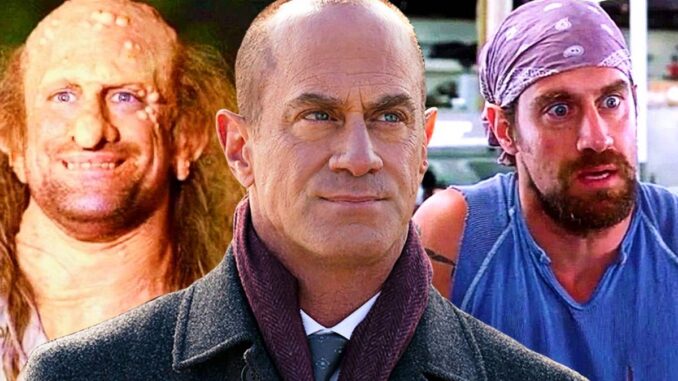
The vacuum left by Detective Elliot Stabler's unceremonious departure from the Special Victims Unit in 2011 was not just a gaping hole in a television show; it was a wound in the hearts of millions of fans. For twelve seasons, Christopher Meloni had embodied Stabler, a character whose volatile intensity and unshakeable moral compass made him the perfect, if often flawed, counterpoint to Mariska Hargitay's Olivia Benson. His sudden exit, a result of a contract dispute, left narratives hanging and a partnership unresolved, fueling a decade of longing, speculation, and the fervent hope for a reunion. Yet, for Meloni himself, the door to reprising Stabler wasn't merely closed; it was bolted shut. It took a very specific convergence of "right vision" and "right timing" to unlock that door and bring back the beloved detective.
Meloni, post-Stabler, was not an actor resting on his laurels. He diversified, exploring a range of roles that showcased his versatility—from the darkly comedic turn in Happy! to the nuanced performances in Oz and The Handmaid's Tale. He proved he was more than just the gruff detective, actively shedding the typecasting that often follows such an iconic long-running role. To return to Stabler, then, wouldn't just be a professional step back; it would risk re-tethering himself to a character he had consciously moved beyond. The idea of simply doing a guest spot on SVU, a brief nostalgic cameo, held little appeal. It would feel inauthentic, a cheap fan service rather than a meaningful artistic endeavor. He had no plan to revisit Stabler unless there was a compelling reason, a fresh narrative, and a true challenge that honored both the character's legacy and Meloni's evolved creative aspirations.
The "right vision" began to materialize not as a simple return, but as an expansion – the creation of a wholly new series, Law & Order: Organized Crime. This was the crucial difference. Instead of shoehorning Stabler back into the familiar SVU procedural format, Organized Crime offered him a new canvas. This vision allowed Stabler to return not as the same man who left, but as a character profoundly shaped by a decade of unseen experience and tragedy. The show's serialized nature, a departure from the episodic SVU, meant deeper character exploration, darker themes, and a more complex, psychologically driven narrative that could delve into Stabler's trauma, his grief, and his attempts at rebuilding his life after the devastating loss of his wife. This wasn't merely a reprisal; it was an evolution. It offered Meloni the chance to explore new facets of a beloved character, pushing boundaries while remaining true to the essence of Stabler, a challenge far more enticing than a fleeting nostalgic visit.
Coupled with this creative vision was the "right timing," a perfect storm of factors that made the return not just possible, but imperative. Firstly, there was the insatiable, enduring fan demand. For ten years, social media churned with pleas for Stabler's return, the "Bensler" ship sailing strong on the tides of unresolved tension. The passage of time had only intensified the collective yearning for closure and connection between the two partners. Secondly, Mariska Hargitay herself was a relentless advocate for the reunion. Her unwavering desire to bring her on-screen partner back, coupled with their genuine off-screen friendship, created an undeniable gravitational pull. The pandemic, too, played an unexpected role; as television production sought to reignite, the comfort and familiarity of a beloved character's return offered a balm in uncertain times, ensuring a massive, ready-made audience.
Furthermore, the television landscape itself had shifted. The rise of interconnected universes, reboots, and character revivals had normalized the concept of bringing back long-lost figures with new narratives. Meloni, having explored diverse projects, was also at a point in his career where the prospect of a new, creatively stimulating long-term role, especially one that allowed him to redefine a character he knew intimately, held a fresh appeal.
The culmination of this vision and timing was a cultural event. Stabler's first re-appearance on SVU, a charged reunion with Benson, shattered ratings records. But it was Organized Crime that truly validated the vision, allowing Meloni to portray a Stabler haunted by grief, grappling with a changing world, and navigating the complexities of his own family and a new assignment. He wasn't the hot-headed detective of old, but a man scarred, wiser, and still fiercely dedicated, yet with a new vulnerability that resonated deeply.
Meloni didn't initially plan to reprise Elliot Stabler because the conditions for a meaningful return didn't exist. It took a revolutionary vision – a serialized new show designed to plumb the depths of his character – combined with the perfect storm of fan fervor, Hargitay's persistence, and a changing media landscape, to create an opportunity too compelling to refuse. It was a testament to creative patience and strategic planning, proving that sometimes, to bring a cherished character back, you don't just open the door; you build an entirely new house for them.
